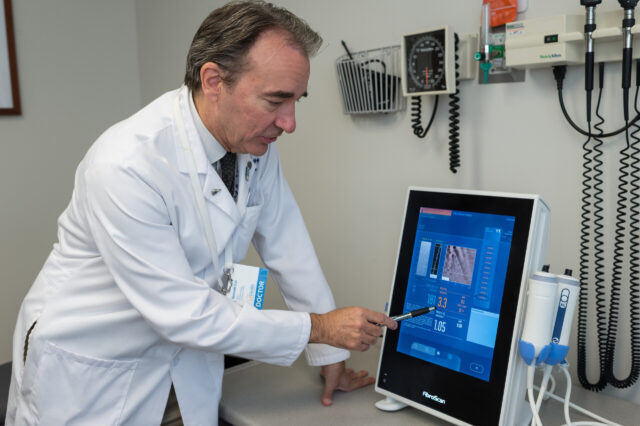UF Health researcher helps show hormone can reverse inflammation from fatty liver disease

Pushed by the obesity epidemic, a rising number of Americans are being diagnosed with nonalcoholic fatty liver disease, a condition that can lead to liver inflammation and cirrhosis. It is now the leading cause of liver transplantation in the United States.
No drug to fight the disease has yet been approved by the U.S. Food and Drug Administration. The best way to fight this potentially deadly inflammation? Weight loss.
A new study co-authored by a University of Florida Health endocrinologist shows a hormone that affects the brain so that patients have less appetite and thereby lose weight resolved inflammation from fatty liver disease in nearly 6 out of 10 people who received the highest daily dosage in a clinical trial.
The study, co-authored by Kenneth Cusi, M.D., chief of the UF College of Medicine’s division of endocrinology, diabetes and metabolism, was published in November in The New England Journal of Medicine by a team of international researchers.
Patients who received a daily injection of the hormone, called semaglutide, on average lost 13% of their body weight during the 18-month trial. Cusi said researchers believe this was the primary mechanism that led to the reduction of liver inflammation, which is called nonalcoholic steatohepatitis, or NASH.
Semaglutide, administered weekly, also is used to treat Type 2 diabetes because it helps the pancreas secrete insulin.
NASH over months, years and even decades can lead to the gradual replacement of healthy liver cells with scar tissue, which is also known as fibrosis or cirrhosis. That, in turn, can lead to liver failure and death, absent a transplant.
“People tend to lose a significant amount of weight on this drug because they’re simply not hungry,” said Cusi. “This is very promising because it might eventually lead to the first FDA-approved drug for halting disease activity and the progression to the fibrosis that can lead to end-stage liver disease.”
The next step is a larger, phase III clinical trial that will include more patients.
The published study began with 320 patients ages 18 to 75 years, 80 of whom received the highest dosage of semaglutide in the trial, or 0.4 mg. FDA approval of the drug is still at least two years away, if the larger trial is successful, Cusi said.
The study found that 59% of participants in the 0.4-mg group had their NASH resolved. Lower doses also showed inflammation resolved, though at a lesser level.
It did not, however, demonstrate a statistically significant reduction in liver fibrosis. Cusi said; however, this might be because of the study’s relatively short duration.
“But as long as you stop the inflammation in its tracks, most patients are not going to progress to cirrhosis and liver failure,” Cusi said.
Side effects of the medication centered mostly on gastrointestinal complaints, such as nausea, constipation and vomiting.
While there are no FDA-approved medications for NAFLD, the diabetes drug pioglitazone has been used by many physicians off-label and has been shown to dramatically reduce liver fat in some patients.
NAFLD is closely intertwined with obesity and Type 2 diabetes. Fatty liver is the most common liver complication, affecting two-thirds of those patients with Type 2 diabetes. It’s estimated that 1 in 6 patients with Type 2 diabetes is at risk of severe liver damage.
NAFLD swells the liver with fat, and while it is typically associated with obesity, it isn’t always. Scientists believe a metabolic breakdown in the body, such as seen in Type 2 diabetes, results in fatty acids being released into the blood, ultimately accumulating in a ready receptacle — the liver.
When too much fat accumulates in the liver, the organ sends out the equivalent of an SOS signal in the form of inflammation. Research has shown that 1 in 10 children and 3 in 10 adults have NAFLD.
“This is one of the most pressing public health problems we’re facing as a nation,” Cusi said. “There are potentially millions of people on the path toward cirrhosis, and the numbers are growing in a way that will stress our health care system.”
Media contact: Ken Garcia at kdgarcia@ufl.edu or 352-273-9799.
About the author
